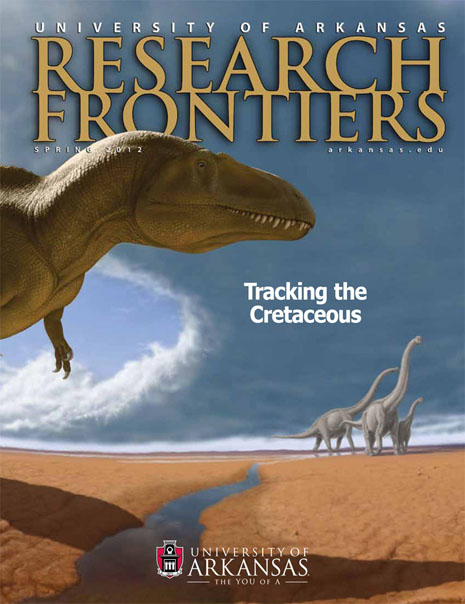
FAYETTEVILLE, Ark. – Dinosaurs walk the beaches of Arkansas! Major appliances talk to their owners! Although you won’t find these headlines in the supermarket checkout line, you can read these stories and more in the in the spring issue of Research Frontiers, in print or on the electronic device of your choice.
“Yes, we want readers to sample the fascinating results of research at the University of Arkansas,” said Melissa Lutz Blouin, the magazine’s executive editor. “We also welcome feedback at the University of Arkansas Research Facebook page.”
The magazine’s four main features involve dinosaurs, dating, green apps and “green” researchers.
“In the Tracks of the Cretaceous” follows geoscientist Steve Boss and colleagues through the sweltering summer heat of southwest Arkansas as they expose and record dinosaur footprints dating back 115 million years. Back then, sauropods and theropods walked the beaches of coastal Arkansas. What we learn from their footprints promises to provide insight into global climate change. The accompanying video shows the scientists at work and explains why footprints tell us more than bones can about the dinosaurs and their world.
Jacquelyn Wiersma from the School of Human Environmental Sciences has conducted a series of studies aimed at understanding the factors that go into choosing a romantic partner. Is it simply dating or a dangerous liaison? The answers are more complicated than you’d think.
In the Mobile, Pervasive and Sensor Systems Laboratory, engineers Nilanjan Banerjee and Pat Parkerson teach objects to talk to each other. The systems they design can save energy –through improved monitoring of green homes – and save lives – by speeding disaster relief and providing medical diagnoses at a distance.
The “green” researchers – green as in new to research – are three Honors College students who worked with faculty on ambitious projects. From a new method to convert algae into biofuel to designing neighborhood reconstruction with residents of Kigali, Rwanda, to exploring the relationship between civilization and nature through mythic animal archetypes – this work has implications beyond the classroom.
In other stories, undergraduate Mike Norton explains his work with a cocoa cooperative in Ghana, where he provided the database and training to help cocoa farmers increase their yields, and Michael Riha, set designer in the drama department, explains how it is possible to get to Broadway from Arkansas.
In the Q&A feature, readers can learn what makes a good teacher and just what a floodplain is.
On the Web, Research Frontiers offers several videos. In addition to the dinosaur story, viewers can watch sword-fighters in training, learn about a new tool to speed light rail planning and enjoy a reading by Michael Heffernan of his poem, “The Art of Self Defense.” For chocolate fans, a slideshow from Ghana reveals details of cocoa production.
Readers and viewers alike can stay in touch through the University of Arkansas Research Facebook page and the UArkResearch Twitter Feed for up-to-the-minute news about research at the University of Arkansas.
Topics
- Agriculture
- Architecture
- Fine Arts
- Business & Finance
- Belonging
- Education
- Engineering
- Politics & Government
- Research & Innovation
- Science
- International
- Fay Jones School of Architecture and Design
- Dale Bumpers College of Agricultural, Food & Life Sciences
- College of Education and Health Professions
- College of Engineering
- Fulbright College of Arts & Sciences
- Sam M. Walton College of Business
- Honors College
Contacts
Melissa Blouin, executive director, Research Frontiers
University of Arkansas
479-575-5555,
Barbara Jaquish, science and research communications officer
University Relations
479-575-2683,